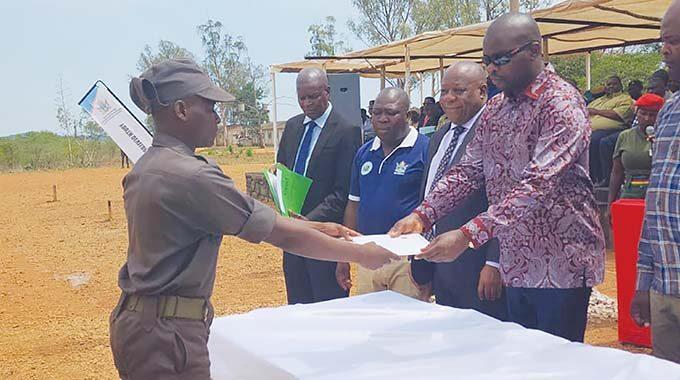News / National
Trouble in paradise: Zanu-PF Youth League faces internal strife
11 Dec 2024 at 06:42hrs |
0 Views

Tensions have erupted within the ruling Zanu-PF party following allegations of an unconstitutional reshuffle of elected executives within the influential Youth League. Youth Affairs Minister Tino Machakaire, a close ally of President Emmerson Mnangagwa, and Tourism Deputy Minister John Paradza, the party's Deputy Secretary for Youth Affairs, are at odds over the unilateral removal of office bearers. Paradza has accused Machakaire of dividing the party through these actions, which he claims violate party procedures.
The reshuffle, which was announced in a December 9, 2024, communication by Machakaire, included the appointment of new officials to key portfolios, such as Tsungai Makumbe as Secretary for Finance, Phineas Makombe as Commissariat, and Garikai Zonde to Science and Technology. The changes were explained by Machakaire as necessary to implement resolutions from the National People's Conference held in October, particularly those concerning President Mnangagwa's ambition to extend his tenure beyond 2028, which would require constitutional amendments.
Machakaire emphasized that the reshuffle was intended to strengthen the Zanu-PF Youth League's ability to fulfill its constitutional obligations and ensure the swift execution of the National People's Conference resolutions. However, Paradza, who represents the opposing faction within the Youth League, strongly objected to the reshuffle, claiming that it bypassed necessary due process.
In a letter dated December 10, 2024, Paradza argued that the reshuffle was invalid because it had not been made in consultation with the provinces, nor was it ratified by the National Youth League Conference of 2022. He further instructed the affected executives to remain in their positions until a formal decision was issued by the party's Secretary-General, thereby placing the reshuffle on hold.
Machakaire responded sharply, asserting that as Secretary for Youth Affairs, he had the authority to make such changes. He claimed that his actions had been endorsed by President Mnangagwa and that Paradza's objection was baseless. In a strongly worded letter, Machakaire demanded that Paradza withdraw his opposition or face disciplinary action, claiming that the reshuffle had been carried out in accordance with party statutes.
Meanwhile, tensions over factionalism within Zanu-PF continue to simmer. In a related development, the Mashonaland West Provincial Coordinating Committee (PCC) held a meeting in Chinhoyi, where they called for Mnangagwa to remain in power until 2030 to fulfill his Vision 2030 agenda. The gathering, the first since the party's October National People's Conference, reaffirmed the importance of unity within the party, with Minister of Justice Ziyambi Ziyambi quashing rumors of a rift between Mnangagwa and his deputy, Vice President Constantino Chiwenga.
Ziyambi insisted that there was no division between the two leaders, emphasizing that Zanu-PF has a single center of power and that all members must remain loyal to the sitting president. The "ED 2030" slogan, which calls for Mnangagwa to continue leading the nation through to 2030, was strongly endorsed at the meeting, with calls for party members to rally behind the President's vision without hesitation.
The internal conflict within the Youth League and the broader Zanu-PF party signals deepening factionalism as the ruling party navigates sensitive issues surrounding leadership succession and constitutional changes. The outcome of the ongoing dispute between Machakaire and Paradza will likely have significant implications for the party's unity as it approaches future electoral challenges.
The reshuffle, which was announced in a December 9, 2024, communication by Machakaire, included the appointment of new officials to key portfolios, such as Tsungai Makumbe as Secretary for Finance, Phineas Makombe as Commissariat, and Garikai Zonde to Science and Technology. The changes were explained by Machakaire as necessary to implement resolutions from the National People's Conference held in October, particularly those concerning President Mnangagwa's ambition to extend his tenure beyond 2028, which would require constitutional amendments.
Machakaire emphasized that the reshuffle was intended to strengthen the Zanu-PF Youth League's ability to fulfill its constitutional obligations and ensure the swift execution of the National People's Conference resolutions. However, Paradza, who represents the opposing faction within the Youth League, strongly objected to the reshuffle, claiming that it bypassed necessary due process.
In a letter dated December 10, 2024, Paradza argued that the reshuffle was invalid because it had not been made in consultation with the provinces, nor was it ratified by the National Youth League Conference of 2022. He further instructed the affected executives to remain in their positions until a formal decision was issued by the party's Secretary-General, thereby placing the reshuffle on hold.
Meanwhile, tensions over factionalism within Zanu-PF continue to simmer. In a related development, the Mashonaland West Provincial Coordinating Committee (PCC) held a meeting in Chinhoyi, where they called for Mnangagwa to remain in power until 2030 to fulfill his Vision 2030 agenda. The gathering, the first since the party's October National People's Conference, reaffirmed the importance of unity within the party, with Minister of Justice Ziyambi Ziyambi quashing rumors of a rift between Mnangagwa and his deputy, Vice President Constantino Chiwenga.
Ziyambi insisted that there was no division between the two leaders, emphasizing that Zanu-PF has a single center of power and that all members must remain loyal to the sitting president. The "ED 2030" slogan, which calls for Mnangagwa to continue leading the nation through to 2030, was strongly endorsed at the meeting, with calls for party members to rally behind the President's vision without hesitation.
The internal conflict within the Youth League and the broader Zanu-PF party signals deepening factionalism as the ruling party navigates sensitive issues surrounding leadership succession and constitutional changes. The outcome of the ongoing dispute between Machakaire and Paradza will likely have significant implications for the party's unity as it approaches future electoral challenges.
Source - newzimbabwe
Join the discussion
Loading comments…





























